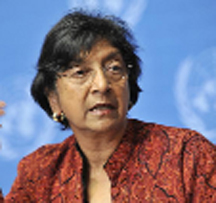GENEVA, (Reuters) – The United Nations’ most senior human rights official urged China yesterday to address deep-rooted frustrations that have led to desperate forms of protest by Tibetans, including some 60 self-immolations since March 2011.

Navi Pillay called on the Chinese authorities to release detainees, allow independent human rights monitors to visit Tibet, and to lift restrictions on media access to the restive Himalayan region.
“Social stability in Tibet will never be achieved through heavy security measures and suppression of human rights,” Pillay said, in a rare statement critical of China.
Her spokesman said the appeal was not issued to coincide with a Communist Party congress opening next week, but that the “time had come to talk publicly” about allegations of violence against Tibetans seeking to exercise their fundamental freedoms.
China’s foreign ministry was not immediately available for comment. Beijing has branded the self-immolators “terrorists” and criminals and accused the exiled Tibetan spiritual leader, the Nobel Peace Prize-winning Dalai Lama, of inciting them.
In the statement, Pillay “urged Chinese authorities to promptly address the longstanding grievances that have led to an alarming escalation in desperate forms of protest, including self-immolations in Tibetan areas”.
As United Nations High Commissioner for Human Rights, she said she recognised Tibetans’ intense sense of frustration but urged community and religious leaders to use their influence to help prevent people from setting themselves on fire.
The victims include seven Tibetans who set fire to themselves in the past two weeks in protest against what they said was repressive Chinese rule in the Himalayan region.
